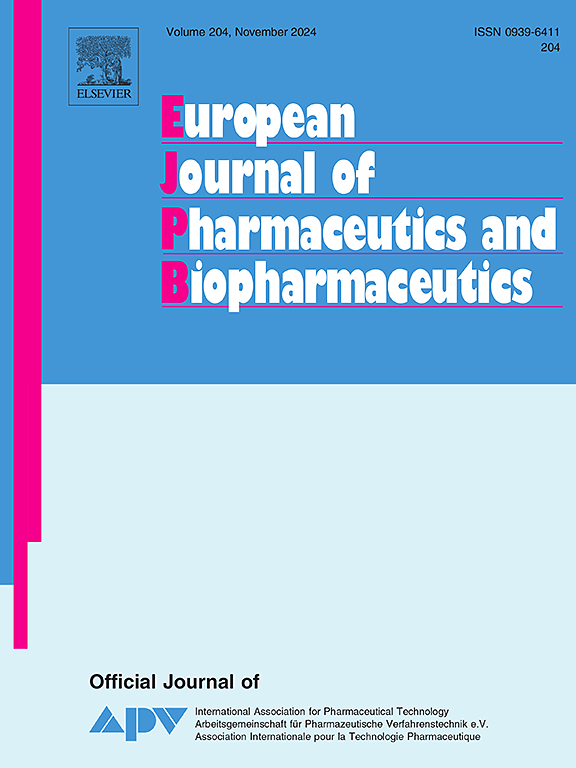Peptide-loaded chitosan nanoparticles improve mitochondrial and cognitive functions via inhibition of Aβ-ABAD interaction in Alzheimer’s disease
IF 4.3
2区 医学
Q1 PHARMACOLOGY & PHARMACY
European Journal of Pharmaceutics and Biopharmaceutics
Pub Date : 2025-06-06
DOI:10.1016/j.ejpb.2025.114778
引用次数: 0
Abstract
Alzheimer’s disease (AD) is the most prevalent form of dementia. Mitochondrial dysfunction is recognized among the earliest pathological events in AD, and is closely-linked with the accumulation of amyloid-beta (Aβ) plaques which is a well-established hallmark of AD. The interplay between the two converges on the interaction of Aβ with the mitochondrial enzyme Aβ-binding alcohol dehydrogenase (ABAD), and the formation of Aβ-ABAD complex. This leads to the suppression of the normal function of ABAD, and elicits a number of detrimental events such as the excessive generation of reactive oxygen species (ROS) resulting in apoptosis of neuronal cells. To intercept the Aβ-ABAD interaction, a decoy peptide (DP) was employed, and was loaded into polymeric chitosan nanoparticles (CSNPs) for efficient delivery across the blood–brain barrier (BBB). In vivo studies on control and neuroinflammatory mouse models confirmed that NPs of the smaller size (SNPs; 59 ± 6 nm) accumulated in the brain with minimal off-target delivery. Unlike free DP, DP-loaded SNPs significantly improved cognitive functions as depicted by the modified Y-maze test. The DP also had protective effects on the mitochondria that were associated with a decrease in Aβ, an increase in ATP and a normalization in SOD activity. Additionally, the restoration of ABAD normal function was reflected by elevated estradiol levels. These findings indicate that the inhibition of Aβ-ABAD complex ameliorates Aβ-induced toxicity in AD, consequently enhancing both mitochondrial and cognitive functions.

肽负载壳聚糖纳米颗粒通过抑制Aβ-ABAD相互作用改善阿尔茨海默病的线粒体和认知功能。
阿尔茨海默病(AD)是最常见的痴呆症。线粒体功能障碍被认为是阿尔茨海默病最早的病理事件之一,并且与淀粉样蛋白- β (a β)斑块的积累密切相关,这是阿尔茨海默病的一个公认的标志。两者之间的相互作用集中在Aβ与线粒体酶Aβ结合醇脱氢酶(ABAD)的相互作用以及Aβ-ABAD复合物的形成上。这导致ABAD的正常功能受到抑制,并引发许多有害事件,如活性氧(ROS)的过量产生导致神经元细胞凋亡。为了阻断a β- abad相互作用,使用了一个诱饵肽(DP),并将其装载到聚合壳聚糖纳米颗粒(csnp)中,以便有效地穿过血脑屏障(BBB)。对照和神经炎症小鼠模型的体内研究证实,较小尺寸的NPs (SNPs;59 ± 6 nm)在脑内积累,脱靶量最小。与自由DP不同,DP加载snp显著改善了y迷宫测试所描述的认知功能。DP对线粒体也有保护作用,这与a β的减少、ATP的增加和SOD活性的正常化有关。此外,雌二醇水平升高反映了ABAD正常功能的恢复。这些发现表明,抑制Aβ-ABAD复合物可改善a β诱导的AD毒性,从而增强线粒体和认知功能。
本文章由计算机程序翻译,如有差异,请以英文原文为准。
求助全文
约1分钟内获得全文
求助全文
来源期刊
CiteScore
8.80
自引率
4.10%
发文量
211
审稿时长
36 days
期刊介绍:
The European Journal of Pharmaceutics and Biopharmaceutics provides a medium for the publication of novel, innovative and hypothesis-driven research from the areas of Pharmaceutics and Biopharmaceutics.
Topics covered include for example:
Design and development of drug delivery systems for pharmaceuticals and biopharmaceuticals (small molecules, proteins, nucleic acids)
Aspects of manufacturing process design
Biomedical aspects of drug product design
Strategies and formulations for controlled drug transport across biological barriers
Physicochemical aspects of drug product development
Novel excipients for drug product design
Drug delivery and controlled release systems for systemic and local applications
Nanomaterials for therapeutic and diagnostic purposes
Advanced therapy medicinal products
Medical devices supporting a distinct pharmacological effect.

 求助内容:
求助内容: 应助结果提醒方式:
应助结果提醒方式:


